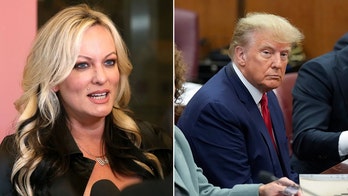In the race to the political center, Democrats could be winning -- at least on the local level.
Virginia Democrats nominated state Sen. R. Creigh Deeds on Tuesday to carry the party mantle in the gubernatorial race this fall. By picking Deeds, the most conservative of the three candidates, state Democrats proved willing to look beyond the base and nominate a candidate who could appeal more to independents and even Republicans in the general election.
"Virginia Democrats made a very smart choice strategically. They have positioned themselves in a way that some Democrats and Republicans in other states have not," said Jeremy Mayer, public policy professor at Virginia's George Mason University.
Whether that trend will be repeated in other states, or by the other party, remains to be seen. But Democrats have already shown their willingness to enlist moderates elsewhere in the past few months, as Republicans squabble over whether it is wise to move in that direction.
And Deeds, who once was the underdog, didn't just win. He annihilated his opponents: one a nationally known, better-funded Clinton family ally; the other, a liberal Democrat whose brother is a congressman in Virginia.
Deeds took 50 percent of the vote in the three-way race. Terry McAuliffe, former chairman of the Democratic National Committee, took 26 percent. Brian Moran, a former Virginia delegate, took 24 percent.
"The scope of the victory is the real shock," Mayer said, adding that the margin of victory shows that appealing to the base in a primary can turn out to be a "really bad strategy."
He argued that the election does not assure that other state Democrats will follow Virginia's example, since Virginia Democrats historically pick middle-of-the-road candidates.
But it could be the start of a trend. Pennsylvania Democrats embraced a "moderate" when they invited Sen. Arlen Specter into their party -- Specter left the Republican Party out of concern that the more conservative Republican challenging him in the Senate primary would win.
And President Obama tapped another moderate Democrat, Kirsten Gillibrand, to fill Secretary of State Hillary Clinton's seat in New York.
On the other side of the aisle, the Republican Party has struggled over the idea of moving to the center. While some Republicans in Congress and figures like Republican National Committee Chairman Michael Steele and former Secretary of State Colin Powell have called on the GOP to look beyond the traditional conservative base, others flat-out reject that strategy.
Talk show host Rush Limbaugh and former Vice President Dick Cheney, two of the most prominent voices in the party following John McCain's presidential loss last year, have ridiculed suggestions that the party is not moderate enough.
Inevitably, the Virginia gubernatorial race this fall ends up being a test of the effectiveness of moderate candidates, as well as the popularity of Democratic policies in Washington.
Going forward, Deeds pledged a "full fight" against Republican candidate Bob McDonnell, while Republicans were quick to try to portray Deeds as less moderate than he might want voters to believe. The Republican National Committee sent out a briefing late Tuesday detailing Deed's "history of voting for higher taxes" and what it said was a record of shifting position on gun rights.
Celinda Lake, a top Democratic pollster, said Deed's victory Tuesday shows that he's a "mainstream and main street Democrat."
Lake, though, rejected the idea that Deeds was a conservative member of the party to begin with, noting that he supports abortion rights and that political labels aren't as significant for governors.
She said the primary does not reflect on Obama since none of the candidates had strong associations with him.
FOX News' Carl Cameron, and FOXNews.com's Judson Berger and Stephen Clark, contributed to this report.




